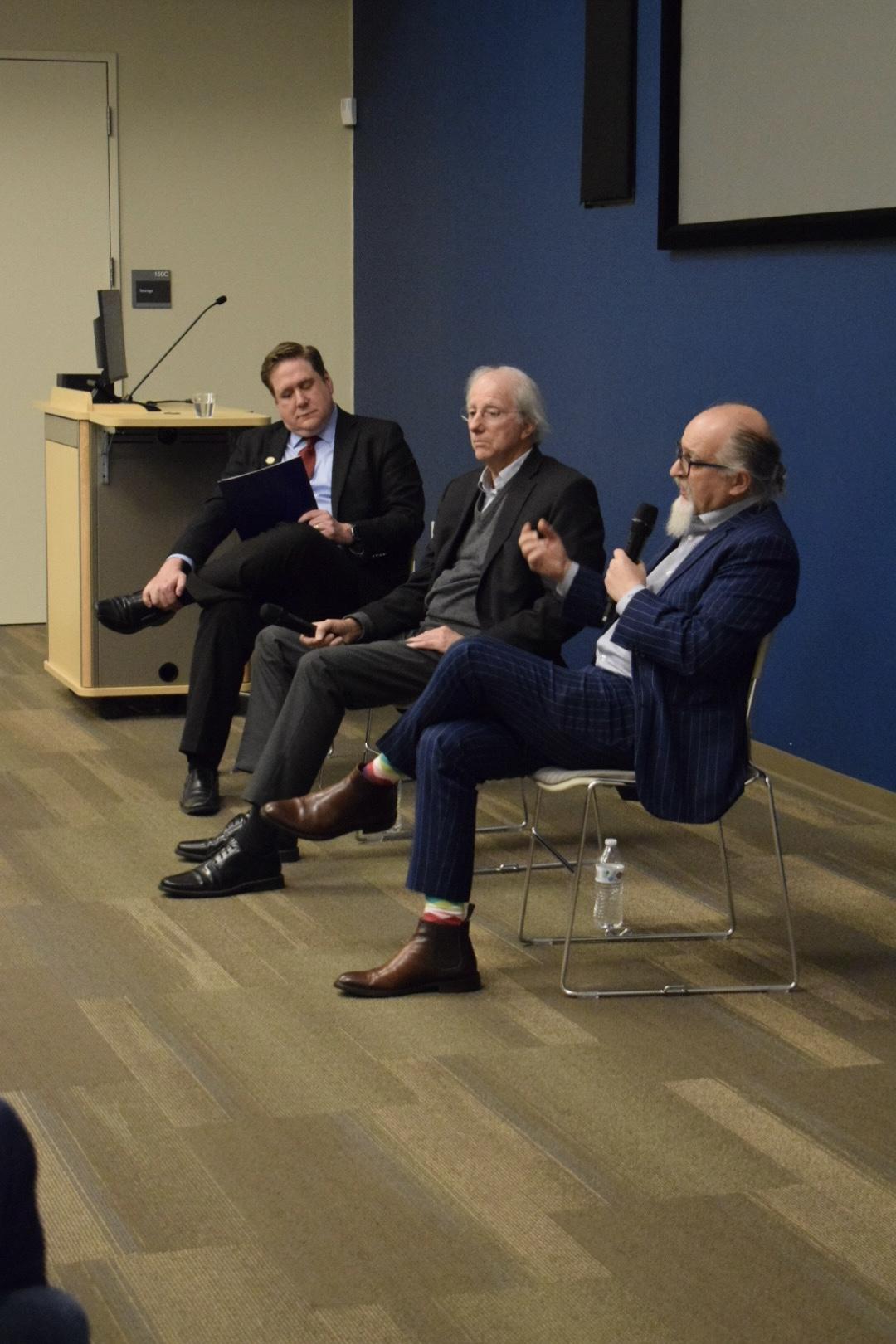Two Middle East policy experts visited the University of Rhode Island on March 26 to discuss the Israeli/Palestinian conflict in a panel co-sponsored by URI Hillel and the URI Department of Political Science.
Representing Palestine was Ghaith al-Omari, a senior fellow at the Washington Institute for Near East Policy. al-Omari served various positions in the Palestinian Authority from 1999-2006, and also worked as the executive director of the American Task Force on Palestine. al-Olmari acted as an advisor during both the 1999-2001 permanent peace talks as well as the 2000 Camp David negotiations.
Dennis Ross represented Israel, holding the title of distinguished fellow at the Washington Institute for Near East Policy. Ross is a professor at Georgetown University’s Center for Jewish Civilization, author and previous central region advisor to the Reagan, Clinton, Bush and Obama administrations.
Ross and al-Omari have known and worked together for 30 years on various agreements and advising issues, notably the 2000 Camp David negotiations.
Both Ross and al-Omari gave the audience a rundown, in their view, on the current state of affairs in the Middle East, both in attitude and physical standing.
“The challenge now given what happened on Oct. 7 and what has happened since is you have a parallel set of traumas,” Ross said. “When countries or societies go through traumas, their capacity to be open to the pain of anyone else doesn’t exist.”
al-Omari mentioned the domestic dysfunction of both Israeli and Palestinian governments, the latter of which is divided into Hamas and the Palestinian Authority.
The divide in Palestinian government has been a barrier to negotiations with Israel, which Hamas is using to their advantage, al-Omari said.
“This is the moment to kind of shuffle the deck, create chaos and hope that ultimately the Palestinian Authority will diminish, and [Hamas] will emerge as the most vibrant voice on the Palestinian side,” al-Omari said.
The conflict will also shuffle the deck in the Israeli government, likely by the end of the year, Ross said.
Ross also mentioned how a Hamas controlled government would hurt Gaza’s economy in the long run, potentially driving away investors to rebuild the decimated area.
“I can tell you there isn’t a single Sunni Arab state that wants Hamas to be in control of Gaza when this is over,” Ross said. “Because you know what that means? It means there’s never going to be hope for Gaza.”
In the long term, both speakers saw the same finale: a two-state solution.
The inability to occupy the same space goes back to the root of the nationalist movements on both sides, al-Omari said. For Israel, that would be Zionism, which is defined as the movement for the re-establishment and development of a Jewish nation in the land now known as Israel. For Palestine, al-Omari said it’s the right to self-determination.
“Both of these national movements want to express themselves through a state of their own,” al-Omari said. “You cannot have these two in one state.”
Ross shared the same viewpoint, which he explained in an advising session with former President Barack Obama when the President asked why the conflict was so hard to solve.
“I said it’s because you’re trying to reconcile two rights,” Ross said. “There’s not a right and a wrong.”
The ongoing nature of the conflict is why Ross said he and al-Omari have been committed to solutions and negotiation for 30 years.
“For those of us who care about a different future for Israelis and Palestinians, we have an obligation to focus on what it takes to change the psychology of this conflict,” Ross said.
The panel discussed the role of the United States in negotiations, especially as Palestinans now view the U.S. as a dishonest broker, panel moderator professor Marc Hutchinson said. This comes after the U.S. recently abstained from voting on the United Nations Security Council ceasefire resolution (resolution 2728) for the month of Ramadan.
al-Omari compared the Israel/Palestine conflict to that of an abusive relationship, saying that only the U.S. has enough leverage on Israel to withdraw them.
“If you want to get out of an abusive relationship, you need a good trusted friend to hold your hand,” al-Omari said. “For Israel, which is a very traumatized nation given the both distant and modern history of the Jewish people, there’s only one state that Israel trusts.”
While al-Omari was answering an audience question about reliable news sources, a student raised her hand and asked him about live videos shared on social media.
The student questioned al-Omari’s statement that social media coverage wasn’t reliable, referencing live videos that have been shared by Palestinian residents in Gaza. al-Omari amended his previous statement.
“I’m not saying don’t use social media as a source,” al-Omari said. “The problem with the algorithm is that you only get exposed to one set of views.”
The exchange prompted a back and forth between two audience members, debating the legitimacy of statistics released on both sides of the conflict.
Both speakers urged college students who want to get involved to keep an open dialogue on campus. al-Omari said he didn’t ask students to abandon their personal attachments, but to keep an empathetic view. Ross said he wanted to see diverse groups discuss the conflict on campus, in small numbers at first.
“If you can’t have a dialogue on a college campus, where can you have a dialogue?” Ross said.
More information on the Israel-Hamas conflict can be found at www.news.un.org .

